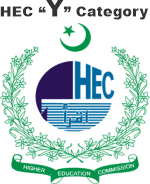A COMPARATIVE STUDY OF TWO DRAMAS WRITTEN BY UMERA AHMED: “ZINDAGI GULZAR HAI” AND “KANKAR”
Keywords:
Pakistani Culture, Dramas, Umera Ahmed, Zindagi Gulzar Hai, KankarAbstract
This research paper conducts a detailed comparative study of two famous Pakistani TV dramas, "Zindagi Gulzar Hai" and "Kankar." In recent years, the Pakistani drama industry has earned a lot of recognition not just within the country but also worldwide by targeting an audience that can relate to the convincing storylines and get reality checks about Pakistani cultural and societal norms. The study shows various aspects of these dramas, like the message they want to convey, their storylines, themes, characters, dialogues, self-improvement, and transformation of the characters. Additionally, it investigates how women in both dramas face challenging lives under the constant pressure of meeting societal expectations and transforming their personalities for the better. Both dramas are related to women's empowerment and their character development. On the other hand, it also highlights the male-dominated society in which women are considered inferior and are often abused physically or mentally by their toxic partners. It also portrays the effects of toxic masculinity on female protagonists. Furthermore, this study shows how these dramas impact their audience, especially encouraging women to take a stand for themselves, and how these dramas have played a role in important discussions about gender equality, women's empowerment, toxic masculinity, and family dynamics in Pakistani culture.
Downloads
References
Abbas, S., & Mahmood, R. A. (2021). Manufacturing Consents In Dissolving Marriages: A Qualitative Content Analysis On Pakistani Urdu TV Dramas. Pakistan Journal of Gender Studies, 21(2), 93-116.
Bhattacharya, S., & Nag, A. (2016). Watching Zindagi: Pakistani social lives on Indian TV. South Asian Popular Culture, 14(1-2), 61-72.
Drisko, J. W., & Maschi, T. (2016). Content analysis: Pocket Guide to Social Work Re.
Faiz, R., Khalid, S., & Mahmood, T. (2020). Promotion of Anti-Social and Anti-Cultural Behavior by Private Television Dramas in Pakistan. Journal of Business and Social Review in Emerging Economies, 6(2), 761-780.
Farooqui, Y. S., & Khan, R. S. (2020). Motivations for Popularity of Turkish Drama Serial" Ertugrul" in Pakistan: A Content Analysis. Global Media Journal: Pakistan Edition, 13(2).
Harwood, T. G., & Garry, T. (2003). An overview of content analysis. The marketing review, 3(4), 479-498.
Head, S. W. (1954). Content analysis of television drama programs. The quarterly of film radio and television, 9(2), 175-194.
Liao, L.-L., Chang, L.-C., Lee, C.-K., & Tsai, S.-Y. (2020). The effects of a television drama-based media literacy initiative on Taiwanese adolescents’ gender role attitudes. Sex Roles, 82, 219-231.
Niaz, B. (2019). Portrayal of Women in Pakistani Drama, An analysis of selected dramas. Balochistan Review, 10(1), 328-338.
Riaz, S., Iftikhar, M., & Aslam, S. (2021). Revisiting Television in Pakistan: A Case Study of Women Representation in Pakistani Television Drama “Zindagi Gulzar Hai. Jahan-e-Tahqeeq, 4(3), 539-550.
Sagheer, I., & Zubair, S. (2020). Women in Punjabi Proverbs: Cultural Models, Gender Ideologies and Stereotyping: Cultural Models, Gender Ideologies and Stereotyping. Journal of Gender and Social Issues, 19(1), 85-98.
Shabbir, T., Farooqui, Y. S., & Shaikh, S. (2021). Pakistani Drama And Critical Analyses On Gendered Display Of Culture. Pakistan Journal of Gender Studies, 21(2), 117-132.
Siddique, R., Bhatti, M., & Ali, R. (2023). How Pakistani Dramas Portray Women: The Comparison between ARY and HUM TV. Global Digital & Print Media Review, VI.
Signorielli, N., & Bacue, A. (1999). Recognition and respect: A content analysis of prime-time television characters across three decades. Sex roles, 40(7-8), 527-544.
Tabassum, I., & Amin, S. (2020). Portrayal of women in Pakistani dramas and its impact on Pakistani society and culture. Human Nature Journal of Social Sciences, 1(1), 23-31.
Zaheer, L. (2019). Parasocial Interaction and Television Viewers in Pakistan. Journal of Behavioural Sciences, 29(1).

Downloads
Published
Issue
Section
License
Copyright (c) 2024 PAKISTAN ISLAMICUS (An International Journal of Islamic & Social Sciences)

This work is licensed under a Creative Commons Attribution 4.0 International License.
This work is licensed under a Creative Commons Attribution 4.0 International License.
































